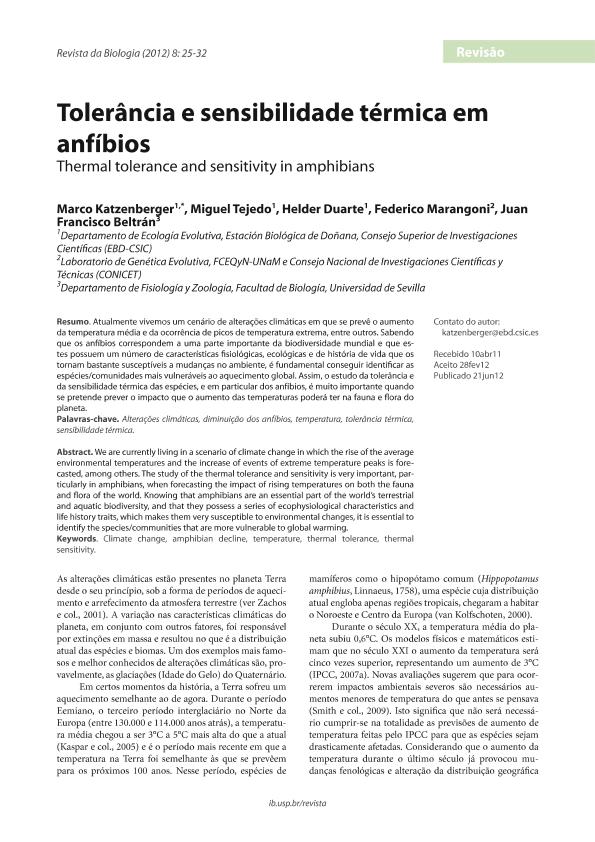Mostrar el registro sencillo del ítem
dc.contributor.author
Katzenberger, Marco
dc.contributor.author
Tejedo, Miguel
dc.contributor.author
Duarte, Helder
dc.contributor.author
Marangoni, Federico

dc.contributor.author
Beltran, Juan Francisco
dc.date.available
2023-05-04T12:22:52Z
dc.date.issued
2012-06
dc.identifier.citation
Katzenberger, Marco; Tejedo, Miguel; Duarte, Helder; Marangoni, Federico; Beltran, Juan Francisco; Tolerância e sensibilidade térmica em anfíbios:Thermal tolerance and sensitivity in amphibians; Universidade de São Paulo; Biologia; 8; 1; 6-2012; 25-32
dc.identifier.issn
1984-5154
dc.identifier.uri
http://hdl.handle.net/11336/196238
dc.description.abstract
Atualmente vivemos um cenário de alterações climáticas em que se prevê o aumento da temperatura média e da ocorrência de picos de temperatura extrema, entre outros. Sabendo que os anfíbios correspondem a uma parte importante da biodiversidade mundial e que estes possuem um número de características fisiológicas, ecológicas e de história de vida que os tornam bastante susceptíveis a mudanças no ambiente, é fundamental conseguir identificar as espécies/comunidades mais vulneráveis ao aquecimento global. Assim, o estudo da tolerância e da sensibilidade térmica das espécies, e em particular dos anfíbios, é muito importante quando se pretende prever o impacto que o aumento das temperaturas poderá ter na fauna e flora do planeta.
dc.description.abstract
We are currently living in a scenario of climate change in which the rise of the average environmental temperatures and the increase of events of extreme temperature peaks is forecasted, among others. The study of the thermal tolerance and sensitivity is very important, particularly in amphibians, when forecasting the impact of rising temperatures on both the fauna and flora of the world. Knowing that amphibians are an essential part of the world’s terrestrial and aquatic biodiversity, and that they possess a series of ecophysiological characteristics and life history traits, which makes them very susceptible to environmental changes, it is essential to identify the species/communities that are more vulnerable to global warming.
dc.format
application/pdf
dc.language.iso
por
dc.publisher
Universidade de São Paulo

dc.rights
info:eu-repo/semantics/openAccess
dc.rights.uri
https://creativecommons.org/licenses/by-nc-sa/2.5/ar/
dc.subject
Alterações climáticas
dc.subject
diminuição dos anfibios
dc.subject
Temperatura
dc.subject
Tolerancia Térmica
dc.subject
Sensibilidae Térmica
dc.subject.classification
Ecología

dc.subject.classification
Ciencias Biológicas

dc.subject.classification
CIENCIAS NATURALES Y EXACTAS

dc.title
Tolerância e sensibilidade térmica em anfíbios:Thermal tolerance and sensitivity in amphibians
dc.type
info:eu-repo/semantics/article
dc.type
info:ar-repo/semantics/artículo
dc.type
info:eu-repo/semantics/publishedVersion
dc.date.updated
2023-04-19T17:24:16Z
dc.journal.volume
8
dc.journal.number
1
dc.journal.pagination
25-32
dc.journal.pais
Brasil

dc.journal.ciudad
San Pablo
dc.description.fil
Fil: Katzenberger, Marco. Consejo Superior de Investigaciones Científicas; España
dc.description.fil
Fil: Tejedo, Miguel. Consejo Superior de Investigaciones Científicas; España
dc.description.fil
Fil: Duarte, Helder. Consejo Superior de Investigaciones Científicas; España
dc.description.fil
Fil: Marangoni, Federico. Universidad Nacional del Nordeste; Argentina. Consejo Nacional de Investigaciones Científicas y Técnicas. Centro Científico Tecnológico Conicet - Nordeste; Argentina
dc.description.fil
Fil: Beltran, Juan Francisco. Universidad de Sevilla; España
dc.journal.title
Biologia
dc.relation.alternativeid
info:eu-repo/semantics/altIdentifier/url/https://www.revistas.usp.br/revbiologia/article/view/108717
Archivos asociados
